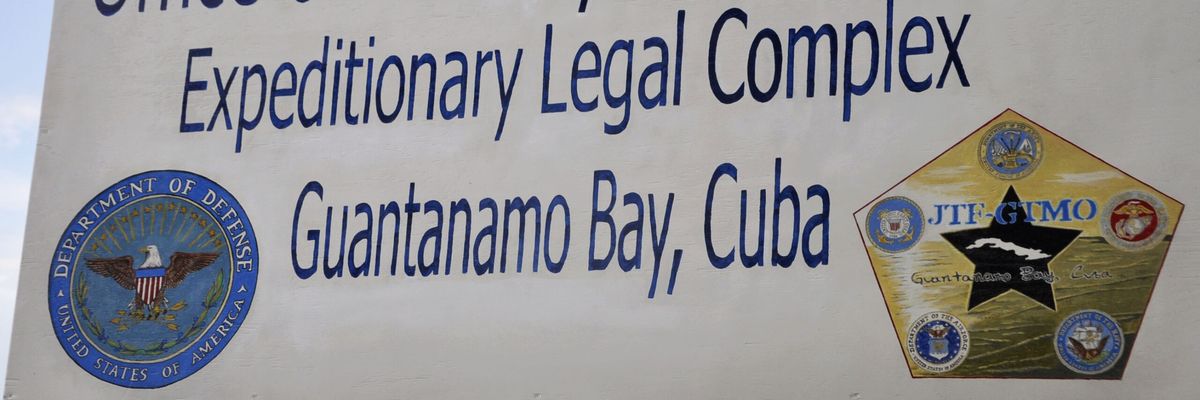There seems to be little effort to hide the fact that the Biden Administration does not plan to close the Guantanamo Bay prison in his first term as he once declared. That pledge is but a whisper on the wind, much like the promises made by his Democratic predecessor Barack Obama. According to a recent New York Times report by Carol Rosenberg, who has been been covering the infamous GTMO for the 20 years since it opened, the military is building a new, secret courtroom on the premises — which won't be completed until 2023.
It's hard to say what is the most disturbing thread in her report, which came out right before the New Year and of course made no waves. (It must be quite difficult to dedicate one's journalistic career to an issue that most Americans have lost all interest in. The torture and detention of other human beings without charge appeared to go out with the government spying illegally on Americans — no one seems to care) According to Rosenberg, the military is building a second courtroom to handle more than one case simultaneously, as the trial of Khalid Sheikh Mohammed and the four other men accused of plotting the Sept. 11, 2001 attacks is still going on. That sort of sounds legit considering there are five others at the prison today charged and awaiting trials, too. However, she points out, this new courtroom will have no gallery for visitors, with proceedings broadcast for journalists and observers on closed circuit with a 40 second delay in a remote room so judges can cut off anything "classified" said during trials:
Only people with a secret clearance, such as members of the intelligence community and specially cleared guards and lawyers, will be allowed inside the new chamber.
As a workaround, the court staff is designing a “virtual gallery with multiple camera angles simultaneously displayed,” said Ron Flesvig, a spokesman for the Office of Military Commissions. The public would be escorted there to watch the proceedings, streamed on a 40-second delay.
During recesses in the current courtroom, lawyers and other court participants often engage with reporters and relatives of victims of terror attacks, routine contact that would be lost with the “virtual gallery.” So would the ability for a sketch artist to observe the proceedings live.
“I’ve observed trial proceedings in person at Guantánamo. The chipper ‘secrecy’ imposed by the military is insulting, anti-democratic, and cowardly,” tweeted Michael Bronner, producer of the 2021 film The Mauritanian, which portrays the plight of GTMO detainee Mohamedou Ould Slahi (incidentally, the former 14-year prisoner spoke at a special Quincy Institute panel on June 8 on the subject of the facility's closure). “The entire enterprise makes a mockery out of what the US pretends to stand for,” added Bronner.
Rosenberg said this was the latest in a serious of moves to make the court and the prison itself less transparent to the public:
For example, for 17 years the military routinely took visiting journalists to the detention facilities where most captives are kept, but required them to delete photographs that showed cameras, gates and other security procedures. Then, the military undertook a consolidation that moved Mr. (Khalid Sheikh) Mohammed and other detainees who were held by the C.I.A. from a secret site to the maximum-security portion of those once showcase facilities — and declared the entire detention zone off limits to journalists.
Their empty, formerly C.I.A.-controlled prison is off limits to reporters too. Defense lawyers who are seeking a preservation order on the site describe it as a rapidly deteriorating facility that was clearly unfit for the prisoners and their guards. One military lawyer who visited there recently described carcasses of dead tarantulas in the empty cellblocks.
The other obvious disturbing angle is that despite earlier reports that the Biden Administration was "quietly moving to close the prison," Rosenberg's report indicates no such thing. Either they have hit a brick wall with Congress and/or those efforts have been suspended, but as I wrote in October, even those prisoners cleared for release have zero-to-no chance of getting out anytime soon. Currently there are 27 men at the scrubby island base who are not charged with any crime and/or awaiting repatriation (compared to the 10 awaiting trail and two already convicted). The administration and military rules have made it virtually impossible for the men who have been cleared to be placed in another country at this point.
To be fair, Congress has shown no willingness to budge on the issue of trying the charged in federal courts, even though we know they would be just as secure, cost the taxpayer less, and adjudicate faster. However, that does not explain why they are making it less transparent, and why there has been no progress on resolving the abomination of keeping 27 souls locked away indefinitely without charge. The administration points to the elaborate legal process set up by the military tribunal system, but that is not enough. Moral courage is in order here, and it seems this administration has as much as any of its predecessors in this regard. Very little.
















